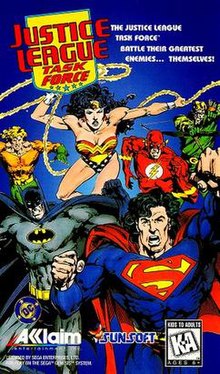Justice League Task Force (video game)
This article needs additional citations for verification. (May 2010) |
| Justice League Task Force | |
|---|---|
 | |
| Developer(s) | Sunsoft Super NES: Blizzard Entertainment Mega Drive/Genesis: Condor, Inc. |
| Publisher(s) | Acclaim Entertainment |
| Composer(s) | Matt Uelmen (Genesis) Glenn Stafford (SNES) |
| Platform(s) | Genesis, Super NES |
| Release | Mega Drive/Genesis: Super NES: |
| Genre(s) | Fighting |
| Mode(s) | Single-player, multiplayer |
Justice League Task Force is a competitive fighting game produced by Sunsoft and distributed by Acclaim for the Super Nintendo Entertainment System and Genesis in 1995. The Super NES version was co-developed by Blizzard Entertainment and the Genesis version by Condor, Inc. (later known as Blizzard North).
It involves characters from DC Comics' Justice League, including Superman, Batman, Wonder Woman, Green Arrow, The Flash, and Aquaman. Additional Justice League members Martian Manhunter and Fire, as well as the supervillain Shrapnel, were also planned to appear, but had to be omitted due to memory limitations.[3]
Story
[edit]
Darkseid attacks the planet Earth, destroying a military base in the process. The player takes control of a member of the Justice League of their choosing, and tracks down the other members for information, only to be attacked by them. As the hero defeats the other Justice League members, they discover that they are in fact android duplicates. Coming to this conclusion, the hero battles Cheetah and Despero for more information.
They both lead the hero to Darkseid, who then forces the hero to fight their own duplicate. Upon defeating the clone, the hero must face Darkseid himself. After the hero defeats him, the other League members are freed, and the military base is restored.
Reception
[edit]Justice League Task Force received mostly negative reviews. The four reviewers of Electronic Gaming Monthly scored the Genesis version a 5.875 out of 10, criticizing the choppy animation, limited number of moves, and most especially the poor controls, which they said made executing special moves "too much work to be any fun."[4] GamePro gave negative reviews to both the Genesis and SNES versions, similarly citing poor controls, unimpressive special moves, and sprites which look good in still frame but ugly in animation.[5]
Next Generation reviewed both ports of the game and gave them two out of five stars. For the Genesis, they stated, "squint your eyes and you could swear you're playing any of the other many fighting games, that doesn't mean Justice League is awful, it's just real normal."[6] For the SNES version: "comic book fans and fighting fans should get a kick out of it, but everyone else is likely to yawn."[7]
See also
[edit]References
[edit]- ^ Sega. "Sega Hardware Archive: Mega Drive: Third-Party Software List". Table, under 1995: "ジャスティスリーグ". Archived from the original on 19 October 2007. Retrieved 29 April 2011.
- ^ "List of Super NES games" (PDF). Nintendo.com. Nintendo of America, Inc. Archived from the original (PDF) on 2012-09-07.
- ^ Electronic Gaming Monthly #58 (May 1994)
- ^ "Review Crew: Justice League". Electronic Gaming Monthly. No. 71. Ziff Davis. June 1995. p. 35.
- ^ "ProReview: Justice League Task Force". GamePro. No. 82. IDG. July 1995. pp. 52, 62.
- ^ "Finals". Next Generation. No. 8. Imagine Media. August 1995. pp. 75–76.
- ^ "Finals". Next Generation. No. 7. Imagine Media. July 1995. p. 78.
External links
[edit]- 1995 video games
- Batman video games
- Blizzard games
- Cancelled Windows games
- Sega Genesis games
- Sunsoft games
- Super Nintendo Entertainment System games
- Superhero video games
- Superman video games
- Fighting games
- Video games based on Justice League
- Video games based on DC Comics
- Video games developed in the United States
- Video games scored by Matt Uelmen
- Green Arrow in other media
- Video games set in Tanzania
- Video games set in Seattle
- Video games set in the United States
- Video games set in Atlantis
- Multiplayer and single-player video games
